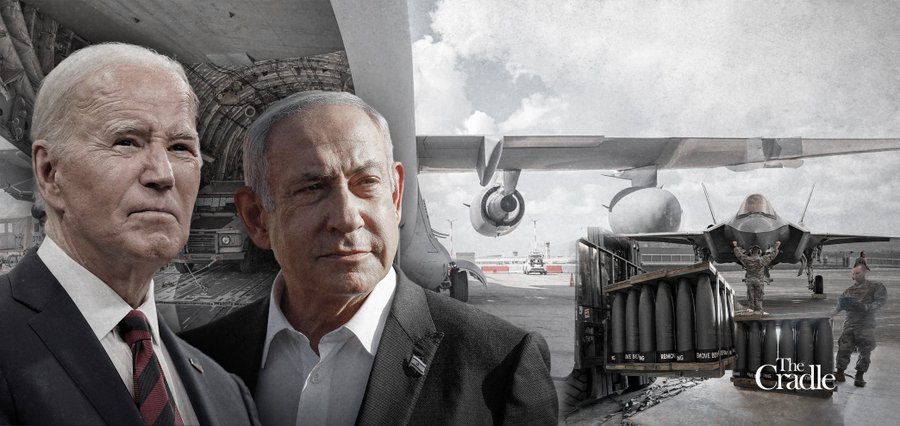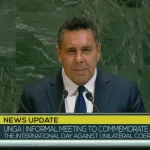
By Abdel Qader Othman – May 15, 2024
Despite public disagreements between Washington and Tel Aviv over Gaza, ongoing US–Israel weapon supplies suggest that the discord is more media spectacle than policy shift.
With Israel appearing determined to launch a large-scale military operation in Rafah to reverse its current image of defeat in Gaza, another public confrontation – between US President Joe Biden and Israeli Prime Minister Benjamin Netanyahu – intensified last week.
Biden claims to have halted the shipment of precision weapons to Israel to prevent a large operation in southern Gaza, where around 1.3 million displaced Palestinian civilians have sought shelter, while Netanyahu threatens to continue the war without Washington’s help.
In a CNN interview last week, the US president said, “I’m not supplying the weapons that have been used historically to deal with Rafah, to deal with the cities – that deal with that problem.”
To which Netanyahu responded that same evening, in a podcast discussion with American Jewish journalist Dan Senor, “If we have to stand alone, we will do so, because I’m the prime minister of Israel, the one and only Jewish state, and we will not go down.”
At first glance, the growing tensions between the two allies playing out in the political and media arenas seemed promising for those parties keen on ending the Palestinian bloodshed seven months after Tel Aviv launched its brutal assault on Gaza.
But the Israeli premier, who has often been caught on camera boasting about Israel’s control over the US political scene, may have won this round. Within just a few days, Biden’s warnings and threats all but dissipated.
It began with a flurry of American politicians hitting the TV circuit to lambast their sitting president for veering from Israel’s war agenda, with some US media outlets describing Biden’s decision as “encouraging antisemitism.”
US ambassador to Tel Aviv, Jack Lew, following the script of his Secretary of State Anthony Blinken, confirmed on Sunday that “fundamentally, nothing has changed in the basic relationship” – that only one batch of US munitions was frozen, but everything else continues to flow “ordinarily.”
And Biden’s meek initiative ended decisively on Tuesday when his administration informed Congress that it is planning a $1 billion weapons transfer to Israel.
Netanyahu certainly knew how to turn the screws.
Confirmation of the status quo
As this was the first rhetorical confrontation between the US and Israel since the Gaza war’s onset, many Arab and western media outlets interpreted the intensity of the exchanges as a result of growing divergence between a Biden administration concerned “for the lives of civilians” and a Netanyahu government seeking to restore the deterrent power it lost on 7 October with Operation Al-Aqsa Flood and Iran’s 13 April retaliatory strikes.
Speaking to The Cradle, Australia-based political analyst Hussein al-Dirani says:
The American administration is primarily responsible for the war of extermination practiced by the Zionist forces against the Palestinians now, in the past, and in the future, and the entity is nothing but one of the arms of American evil in the Arab and Islamic region. Biden can, within one day or less, stop this massacre through an order to the leaders of the aggression to the effect: ‘Stop the war now,’ and it will stop immediately.
The west’s commitment to Zionism
The roots of today’s conflict remain an age-old one: the implantation of the Israeli entity into West Asia, a project of global Zionism originating from the “Herzl Conference” at the end of the 19th century.
For decades, no American or European political leader has had the option of ending support for Israel. The global Israel lobby, now deeply entrenched in western political, academic, media, and finance institutions, aims to protect the existence of Israel at all costs, stabilize it in the region, and push Arab countries to normalize relations with Tel Aviv, explains Yemeni political journalist Osama Sari.
Sari, who is editor-in-chief of the Yemeni Press Agency, tells The Cradle that Biden cannot abandon Israel at this stage, with the contentious US presidential election looming in November and facing great domestic pressure from anti-war US youths and key minority voters.
Some observers believe that Biden’s threat to cut off offensive weapons to Israel was a feint to score points with his restless, disenchanted electorate and to prod Israel into re-opening negotiations for a Gaza ceasefire, which Tel Aviv recently rejected.
Others, like analyst Dirani, contend that Biden’s political ploys cannot effectively influence the presidential contest because Biden and his chief competition, former US President Donald Trump, are both known, longtime, to-the-wall supporters of Israel.
Theatrics of US-Israel’ tensions’
Biden’s short-lived media strategy intended to market the idea that Washington is dissatisfied with Netanyahu’s intransigence and his insistence on invading Rafah to commit even more massacres – turning global and US public opinion further against Israel – despite Hamas agreeing to a ceasefire under the Egyptian–Qatari proposal.
Rhetoric and posturing aside, the US position toward Gaza does not fundamentally differ from Israel’s and may even be more impulsive and irrational. Had it not been for unprecedented amounts of US military support from day one of this round of conflict, the Gaza war would have stalled a good six months earlier. Israel would also not have been able to withstand Iran’s retaliatory response in April without the US military leading all defensive operations, nor even hope to thwart the combined military operations of the region’s Axis of Resistance.
In the UN Security Council, the US has a long history of using its veto power to shield Israel. Out of the 262 vetoed resolutions since the UN’s inception in 1945, Washington has wielded its veto 116 times on issues related to Palestine.
It used this power 80 times to prevent condemnation of Israel and 36 times against laws supporting Palestinian rights, with the latest veto coming down just a month ago.
The White House and the State Department also consistently provide cover for Israel, claiming absurdly that the occupation state is defending itself by international law and that the US has not observed any violations in Gaza despite the Palestinian death toll exceeding 35,000 and the number of wounded surpassing 78,000.
Strategic Setbacks for US, Israel as the Resistance Axis Gains Ground in Syria
Whose red lines?
This unquestioning support of Israel, despite mumblings in some Beltway corridors that Tel Aviv is becoming a “US liability,” begs the question of whether there is any US red line for malign Israeli behaviors. Yemeni editor Sari doesn’t see the Americans drawing any lines for Israel, no matter the crime:
Until now, no international party has been able to classify Biden’s red lines. His attempt to suggest that it was an invasion of Rafah is not convincing at all. The entity has not left any red lines since the beginning of its aggression against Gaza, and its crimes affected hundreds of patients in the hospitals it stormed.
In fact, Sari adds, “This point does not reflect real seriousness, as Biden and Blinken stated in November that there were no red lines that would prevent military support for Israel against Hamas.”
Journalist Dirani agrees, reflecting growing Arab opinion that the US is only stage-managing matters and shows little intent to pressure Tel Aviv into a resolution of this brutal war:
Biden wants to tell Netanyahu that instead of committing 100 massacres a day in Rafah, he should commit 90 massacres. This is why he did not reach 100, meaning that the massacres should be commensurate with America’s brutality and not with Netanyahu’s well-known brutality.
Dirani further assesses, based on their statements, that all Resistance Axis factions understand the US is complicit in the Gaza genocide and is ultimately the root cause of all tragedies, scourges, and wars in the region.
Finger-pointing aside, this perception of US complicity in Gaza is growing fast in global discourse. Efforts to divest from and boycott Israel are on the rise; many of these targets are weapons factories and transport and logistics firms.
If Israel proceeds with an invasion of Rafah, the repercussions could be severe, leading to the wholesale collapse of US interests in West Asia. As Yemen’s waterway blockades, Iranian strikes, and strategic military operations and salvos from Lebanon’s Hezbollah, the Palestinian resistance, and the Iraqi resistance have demonstrated, today it is the leaders of the Axis who are setting those red lines, not western powers.
- Orinoco Tribune 2
- Orinoco Tribune 2
- Orinoco Tribune 2
- Orinoco Tribune 2
- Orinoco Tribune 2
- Orinoco Tribune 2
- Orinoco Tribune 2
- Orinoco Tribune 2

















